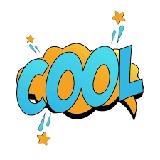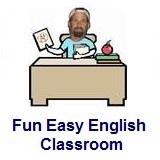|
|
| |
|
|
| |
|
|
| Fun Easy English Classroom January 19 |
|
| |
Classroom
Today
Introduction
to
American English
slang |
|

Today in the Fun Easy English classroom you are going to learn about American English
slang. |
 Hey
if you cannot understand something on this page, Hey
if you cannot understand something on this page,
then use the Fun Easy English
dictionary
(opens in a new window) |
|
|
|
 Slang:
Introduction Slang:
Introduction
Knowing the slang used in American movies, television,
and popular music is very cool. You will be able to understand
native American English. |
|
|
American English slang
definition
Slang is the non-standard use of words
in a language and sometimes the creation of new words or
importation of words from another language.
Slang terms are often particular to a
certain subculture, such as skaters, or musicians.
Slang is used extensively in American TV, movies, music,
literature, and in conversations among native English
speakers. |
|
|
American English slang example
"hang"
I think that we should "hang" at the
beach today.
The meaning of this slang term is to "spend time."
The word "hang" has a completely
different meaning in standard English usage.
hang - To fasten from above with no support
from below. |
|
|
|
 From
YOUR Teacher: Using
Slang From
YOUR Teacher: Using
Slang
Studying slang is important in order to understand
American TV, movies, music, literature, and
conversations among native English speakers.
International students who are studying English should
not use slang too often in their daily conversations
with native American English speakers. Slang is
generally an unsophisticated form of expression and can
sound very strange if overused and especially if used
incorrectly. |
|
|
|
|
Additional Lessons |
 About These
Lessons About These
Lessons
The following classroom lessons are great for students
who want additional conversation, listening, and reading
practice. |
-
Conversation Lesson -
Beginner Level. Let's
Learn English conversation lesson
with a conversation video, a video script, audio
listening practice, video speaking practice, video
pronunciation practice, a new
words section, and a writing activity.
|
 Conversation Lesson
19 - When Do I Start? Conversation Lesson
19 - When Do I Start?
(Beginner -
Conversation, Listening, Reading)
In this lesson Anna has to walk to work because the
Metro is closed. She calls to tell her boss she is late.
Ms. Weaver wants her to come and talk about a new
assignment. What will Anna do? |
Lesson Video
Watch the video and then do the activities on this page. |
Video Script
Anna: Hi there! Summer in Washington, D.C. is hot and sunny. I always ride the
Metro to work. Riding the Metro is cool and fast. But today it’s closed. So, I
am walking to work.
(On the phone) Ms. Weaver, I am late this morning. The Metro is closed. So, I am
walking to work.
Caty: That’s too bad. It’s really hot today.
Anna: Yes it is.
Caty: When you arrive, please come to my office. I have important news to tell
you.
Anna: Of course. Good-bye. My boss has news for me. The question is: Is it good
news or bad news?
(At work)
Anna: Hello, Ms. Weaver.
Caty: Anna, I have good news and I have bad news. Which do you want to hear
first?
Anna: The good news. No … okay, the bad news.
Caty: The bad news is you are not good at reading the news.
Anna: Oh. I am very sorry to hear that.
Caty: So, starting next month you will not read the news.
Anna: Next month is July. You are firing me in July.
Caty: No. I am not firing you in July … or in August or in September. That is
the good news.
Anna: Okay. You are not firing me. I am not reading the news. What will I be
doing?
Caty: Well, you are good at asking questions. You are good at talking to people.
You are good at showing your feelings. And you are great at being silly.
Anna: Thank you, Ms. Weaver. But what does all that mean?
Caty: I have a new assignment for you! Your skills are perfect for a new show …
a children’s show.
Anna: A children’s show ... That is awesome! When do I start?
Caty: You start next month. Start thinking of ideas for the show.
Anna: I have tons of ideas! I can show children what it’s like in outer space
...
Caty: Great …
Anna: … or in the deep, dark ocean …
Caty: Those are great ideas, Anna. Please go think of more … at your desk.
Anna: Yes. What other things can I show them? Mt. Everest! Everyone has
different skills. You have skills. I have skills. The important thing is to know
what you are good at. Until next time! |
Listening
Now practice listening to only the audio portion of the conversation. |
Speaking
Learn to pronounce the new words for this lesson and the months of the year.
Learn about using which for offering choices and every or next with time words. |
Pronunciation
In this video, learn how English speakers say the second month of the year. |
|
New Words |
- arrive -
v. to come to or reach a place after traveling
- assignment -
n. a job or duty that is given to someone
- child -
n. a young person (plural: children)
- closed -
adj. not operating or open to the public
- deep -
adj. having a large distance to the bottom from
the surface or highest point
- everyone -
pron. every person; everybody
- fire -
v. to dismiss (someone) from a job
- idea -
n. a thought, plan, or suggestion about what to
do
- mean -
v. to cause or result in (something)
- month -
n. any one of the 12 parts into which the year
is divided
- Mt. Everest -
n. a mountain in Asia; it is the highest
mountain in the world
- ocean -
n. the salt water that covers much of the
Earth's surface
- other -
adj. used to refer to the one person or thing
that remains or that has not been mentioned
- outer space -
n. the region beyond the Earth's atmosphere in
which there are stars and planets
- perfect -
adj. having all the qualities you want in that
kind of person or situation
- silly -
adj. playful or funny
- skill -
n. an ability to do something that comes from
training, experience, or practice
- ton -
n. informal: a large amount; in the US, a ton
is a unit for measuring weight that equals 2,000 pounds (907 kilograms)
|
 Activity Activity
What are your skills? Do you use them at work or at
school? Tell us about a couple of skills you have. Write
about it in the Facebook Comments section below. Then
practice talking with a friend about what you do at
different times of the year.
Click
lesson activity to get the printable PDF version. The
page opens to a new window. |
|
|
 Conversation
Lessons Conversation
Lessons
Study all 52 English conversation lessons. Let's Learn
English conversation lessons each with a conversation
video, a video script, audio listening practice, video
speaking practice, video pronunciation practice, a new
words section, and a writing activity.
These
lessons are for beginners. |
|
Source:
Voice of America |
|
|
|
|
|
|
|
 Hey Students, Hey Students,
Use this dictionary and reference to look up any words you do not
understand in Fun Easy English.
Note: search opens in a new tab. |
|
|
|
|
|
Search Fun Easy English |
|
|
|
|
|
|
|
|
|
|
|
|
|
|
|
About
Contact
Copyright
Resources
Site Map |